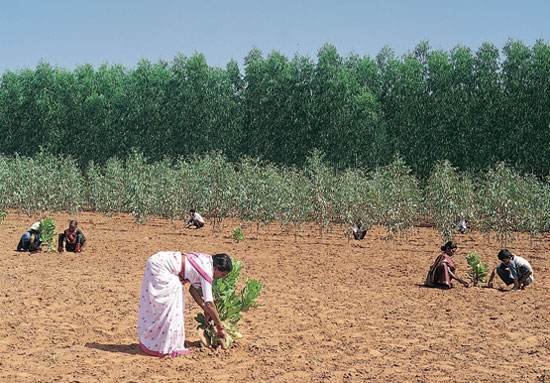| Synergising business growth with the
creation of sustainable livelihoods ITC’s farm forestry programme is a telling example of linking
business purpose with the creation of sustainable livelihoods and environment protection.
It is not well known that apart from initial conditions of unequal endowment of natural
resources, climatic seasonality is a critical determinant of poverty in India. Access to
livelihood fluctuates seasonally, both in the strength of the labour force and in the
number of days of work available during particular months. Deterioration in the natural
resource base also impairs the means of sustainable income. The erosion of the soil by
several weathering agents results in the loss of humus and biotic life, leading to
reduction in fertility and productivity. As per the estimates of the Indian Council for
Agricultural Research (ICAR), the present average soil loss is over 16 tonnes per hectare
per year, which is at least three to five times the normal. Areas affected seriously by
salinity, alkalinity and wind and water erosion cover an estimated 126 million hectares,
accounting for nearly 41% of the total geographical area of the country. Further, it is
estimated that out of the total 95 million hectares of land under rainfed conditions, 70
million hectares are in some stage of land degradation. Sub-optimal land use is also
evident from the fact that degraded wastelands cover at least 35 million hectares, around
18% of total cultivable land.Forest cover plays a critical role in maintaining the soil
and water base for food production in arid and semi-arid lands. In areas where wind is the
main agent of erosion, wooded areas can help contain erosion. Trees also alleviate the
ill-effects of drought and desertification and provide protection from the adverse effects
of seasonality. Landsat imagery data indicate that out of 75 million hectares recorded as
forest area, only 64 million hectares sustain actual forest cover. Out of these, only 35
million hectares have a crown density of 40%. Thus real forests account for barely 11% of
the geographical area of the country.
ITC’s farm forestry project is driven
by the realisation that India’s meagre forest cover has serious and adverse economic
and environmental implications for the rural poor. The Company has effectively leveraged
its need for wood fibre to provide significant opportunities to economically backward
wasteland owners. This initiative builds grassroots capacities to initiate a virtuous
cycle of sustainable development. Working with select NGOs and the Government of Andhra
Pradesh, ITC identifies poor tribals with wastelands and organises them into
self-supporting forest user groups. The user group leaders are trained in the best
silvicultural practices to grow high quality timber as a viable crop, and other local
species that meet domestic fodder, fuel and nutrition requirements. ITC provides a
comprehensive package of support and extension services to farmers encompassing loans for
land development, planting of saplings, plantation |

